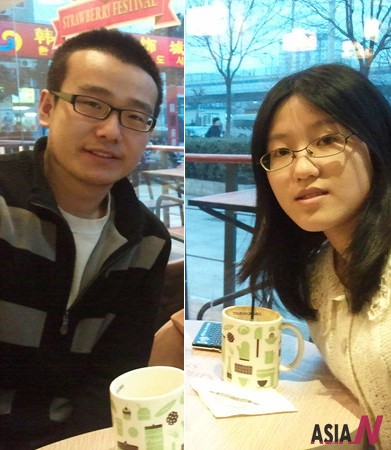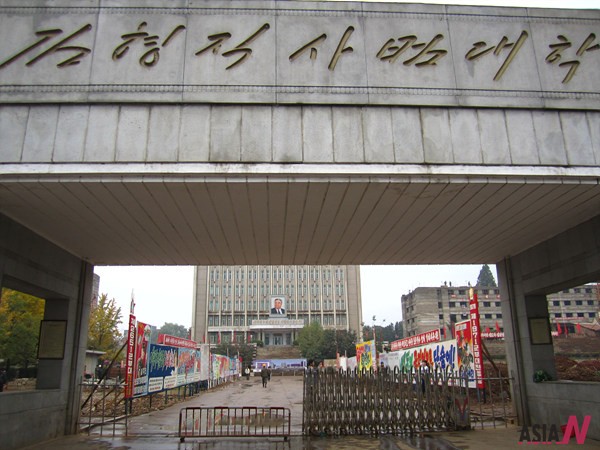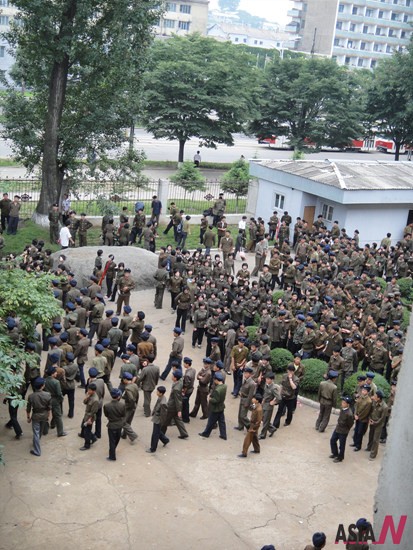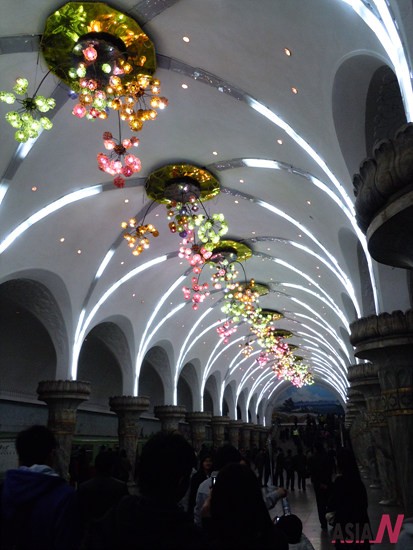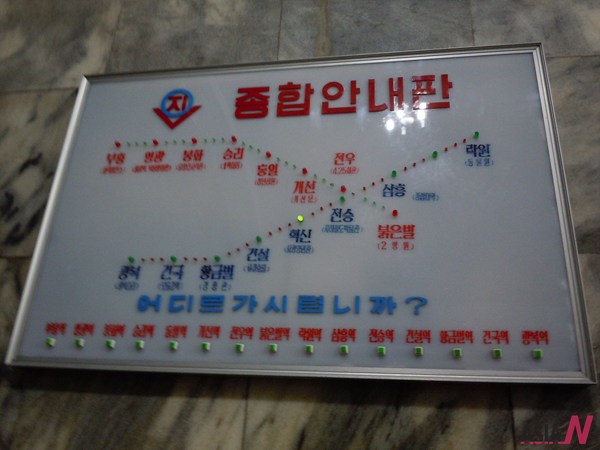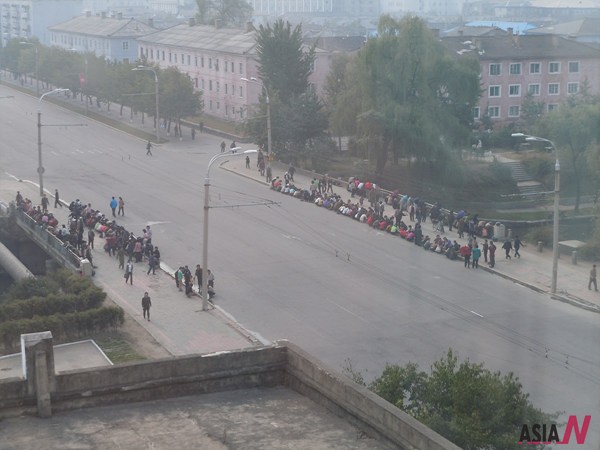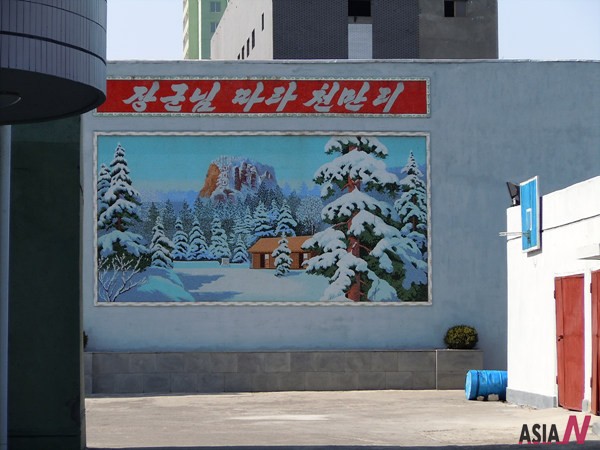Stay in Pyongyang teaches many things
Interview with Chinese students who studied Korean in Pyongyang
BEIJING – A growing number of Chinese students are coming to Seoul and other major cities of South Korea for studying. Of some 90,000 total foreign students here, about 70 percent are from China. However, not a few other Chinese students also go to Pyongyang, North Korean capital, to learn Korean. They may be the only people in the world being able to go Pyongyang freely for study.
Two Chinese students in their early 20s who studied in Pyongyang, complied with the request to have an interview with the AsiaN. The interview which took place earlier on Mar. 2 at a downtown cafe near the Wudaokou Station here, was aimed at taking a glimpse of what the living in Pyongyang was like.
Of the two, one sudent identified himself as Ka Ji-hang, 23, and the other one, also 23, wanted to remain herself anonymous. Another female student Jung Hun-woo, 23, who studied in Sangmyung University in Seoul as an exchange student last year also attended the interview.
Ka started to recollect his study in Pyongyang by saying that “the education environment there wasn’t very good. But, I will never forget the experience in North Korea in the rest of my life.”
They studied at Kim Hyung-jik Univesity of Education for seven months starting April last year. The school, named after father of Kim Il-sung, was founded in 1948 and is regarded as one of the best schools in North Korea.
China was learned to have sent about 100 students from five foreign language schools in Beijing to Kim Hyung-jik Univesity of Education last year. Another 100 students from Beijing University went to Kim Il-sung University for language course last year, according to Ka.
Each of the Chinese students was paid $500 per two months in addition to the monthly support of 40 euros from North Korea, he revealed.
Ka seemed to have no problem in making himself understood in Korean, but his Korean was full of North Korean accent.
“I am concerned about my accent. Actually, I wanted to learn the South Korean accent, but I couldn’t because of my study in Pyongyang. Though difficult, I am trying to avoid using North Korean accent after I returned to China.
However, he also expressed his hope that “someday I want to return to Pyongyang looking for business chances. At that time, my North Korean accent will be of great help to me. I am also looking forward to working at the Chinese Embassy in Pyongyang in the future.”
Below is the questions and answers AsiaN had with the three Chinese students:
Speaking Korean in NK accent, hard to make friends
Q: Did you make a lot of friends there?
A: “There was no North Korean students in our class. We took lessons only among foreigners. If we studied at South Korea, we would have been able to make a lot of friends. In Pyongyang, we had few chance of getting together with local students. What’s regretable was the fact that those who studied in Pyongyang were found to be far behind those who went to Seoul in the capability of speaking Korean.”
The female student who wanted to remain anonymous said that “I spent all my leisure time in dormitory. When I happened to meet North Korean students in dormitory, they only talked about study nothing else. When I tried to jump on other topics, they didn’t comply with it. They tended to make all sort of excuses to get out of the room and avoid talking with foreigners. In the subway I was about to help a middle-aged lady with her heavy burden, but she rejected it.”
Don’t take pictures in Pyongyang
Q: How was the subway in Pyongyang?
A: “Subways in Pyongyang was so deep that we had to went down and up with escalator. It costs 500 NK won (about 0.02 yuan) per ride. There was only two subway lines, not so long enough. The trains were always crowded and the air in the train didn’t feel like clean.”
Q: Did you go out to downtown area often?
A: “Shuttle buses came every morning and evening to pick us up to and from dormitory to school. We were prohibited from going out of dormitory after 9 p.m. and all streetlights went off at night. But, I visited market place when there was no class and was able to see the night view of Pyongyang,” said Ka.
In addition to that, they also quoted stories of other Chinese students who studied in Pyongyang which said “Three or four Chinese students went to a market in Pyongyang. When one of them took a picture of a grocery woman, a bunch of ladies came in protest and snached the camera. A plainclothes policeman appeared out of nowhere and took him away. That was around three p.m. But, the student returned dormitory at around midnight. He said that he was so frightened that he pretended to be sick and managed to escape from the situation. A Chinese Embassy staff visited dormitory next day to know what really happened.”
Q: Was it hard to take pictures in Pyongyang?
A: It’s possible to take pictures of things that looked good, but not of those looking ugly. The citizens also didn’t like being taken pictures.
Q: How was the meal in school?
A: “We had all three meals at the dormitory dining hall. We were not satisfied with the quality and complained about the food to our Embassy. As a result, the meals got better. But, we had to buy German juice, Southeast snacks, Singapore noodles and Australian milk at the department store to augment the poor meals. We also drank Taedonggang Beer and NK soju.”
It takes 20~30 days to exchange letters between Pyongyang and Beijing
Q: How did you contact with your family in Beijing?
A: “The moment we arrived in Pyongyang, they took away our cell phones and returned them seven months later when we were to leave for Beijing. We could write letters, though not allowed using internet or cell phones. When I wrote a letter to my friend in Beijing, it took 30 days to reach him and 20 days to receive answer from him.”
Q: Was it possible to make an international phone call?
A: “I went to a hotel in Pyongyang once a week to make an international phone call to my parents or girl friend in Beijing. There were only three places including two hotels where international calls were possile. They were Koryo Hotel, Changkwanwon Hotel and the International Communication Agency. The cost was expensive, about 2000 won (about 12 yuan) per a minute.”
Chinese students spent their leisurely time in dormitory seeing dramas and movies they already recorded in their laptop computer from Beijing.
The anonymous Chinese student also added that “I had no other choice but to see Korean dramas a lot because internet was out of use.” Jung Hun-woo who studied in Seoul said “my friend in Pyongyang made copies of his South Korean TV drama files for two North Korean students at their request.”
Ka revealed that he attended the reception hosted by the Chinese Embassy to celebrate the North Korean founding anniversary on Sept. 9 last year as one of the representatives of Chinese students. “There were three TV channels in North Korea. Most Programs were about war and revolution and there was no romantic drama.”
Kim Jong-il walked at snail’s pace three months before his death.
Q: Did you see military parade in Pyongyang?
A: “The military parade held at the Kim Il-sung square in Pyongyang on Sep. 9 was magnificent. I saw Kim Jong-il and Kim Jong-eun at a place only 50 meters away from them. People were so deeply moved that they were seen burst into crying. But, I could not understand why they were crying. It was only 3 months before Kim’s death. He walked slowly. Kim Jong-eun seemed to be immature and fat.”.”
Q: Do you have any good memories?
A: “A teacher told us that ‘you should study new knowledges’ while teaching us in the class. I remember him as a teacher with an open-minded thinking. I cried at the farewell party from the thought that there would be no way of meeting them again or even contacting them once I left for home. The teach didn’t let me know his address. The only way to contact him now is to ask other Chinese students leaving for Pyongyang to deliver my personal letter to him.”
Park So-hye fristar@theasian.asia





















